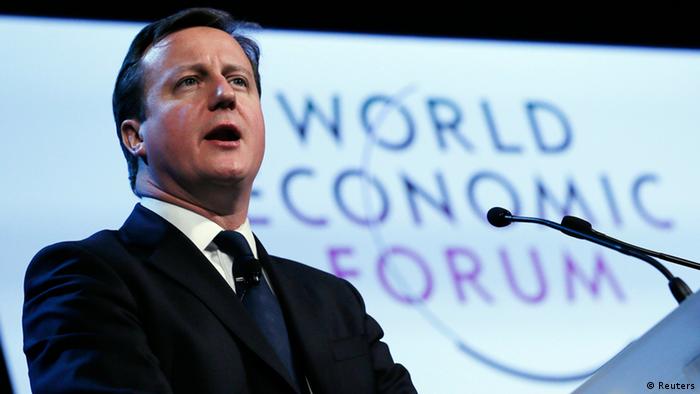British Prime Minister David Cameron has been in the spotlight at the Davos World Economic Forum, a day after he promised the British an EU membership referendum. He said it was "not about turning our backs on Europe."
The British prime minister focused more on the country's leadership of the Group of 8 industrialized countries in Davos on Thursday morning, rather than the pivotal speech he gave in London on Wednesday.
He said his plan for an in/out referendum on EU membership in Britain - to take place only if Cameron wins re-election and almost certainly not before 2017 - was "not about turning our backs on Europe, quite the opposite. This is about how we make the case for a more competitive, a more open, a more flexible Europe, and how we secure the EU's place within it."
Davos operator Klaus Schwab had said in his introduction that the Wednesday's speech was "historic," saying the assembled delegates were "very anxious" to hear more on Cameron's plans for Europe.
"There is a big, looming, insistent question. And that is: how do we compete and succeed in the global economic race that we are in today," Cameron told assembled politicians and business leaders at the Swiss ski resort.
The Conservative premier said the changes he planned to seek for EU treaties would aim to combat this, claiming he was compelled to act owing to other developments within the bloc.
"The club we belong to is changing, we can't ignore this, change is under way," Cameron said. "And the debate about what this means, it is live, it is happening right now."
The prime minister referred in particular to changes tied to the banking sector and the single currency, the euro - a currency which Cameron said Britain was "frankly never likely to join."
Terrorism, taxes
For the most part, however, Cameron focused on different issues in Davos. The British leader began with the conflict in Mali and the hostage-taking at an Algerian gas field last week, saying he believed the international community was "in the midst of a long struggle against murderous terrorists."
"The French are right to act in Mali and I back that action, not just with words but with logistical support, too," Cameron said.
During Britain's presidency of the Group of 8 industrialized countries, Cameron said that tax evasion and also tax avoidance should be a key focus.
"I am a low-tax Conservative but I'm not a companies-should-pay-no-tax Conservative," Cameron said.
"Any businesses who think that they can carry on dodging that fair share or that they can keep on selling to the UK and setting up ever-more complex tax arrangements abroad to squeeze their tax bill right down. Well, they need to wake up and smell the coffee because the public who buy from them have had enough," he said.
One company whose tax returns have come under particular scrutiny in the UK in recent months is coffee behemoth Starbucks. Cameron pointed out more than once, however, that Britain had the lowest corporation tax in the G7.
German Chancellor Angela Merkel is due to address Davos at 1415 local time (1315 UCT) on Thursday.
msh/ipj (AFP, dpa, Reuters)

Comments